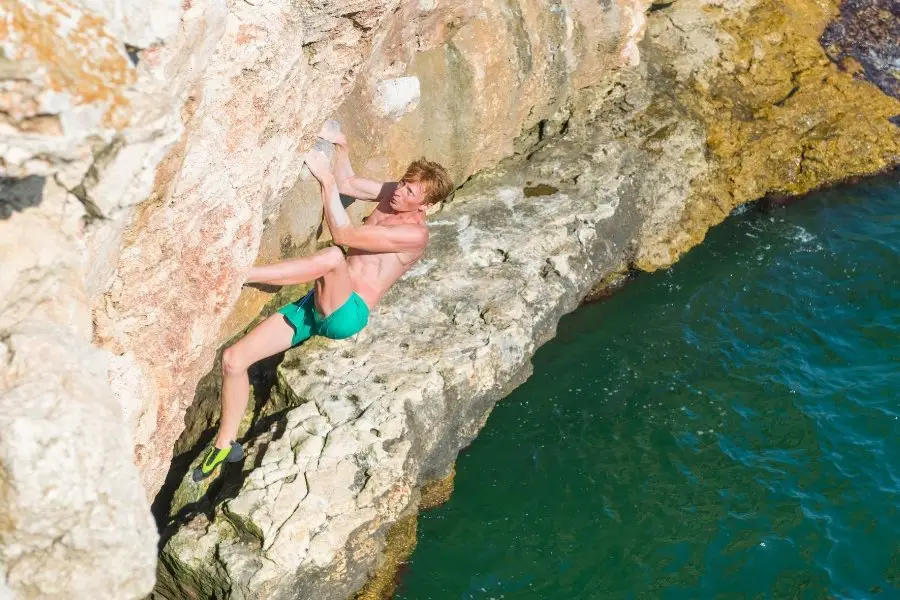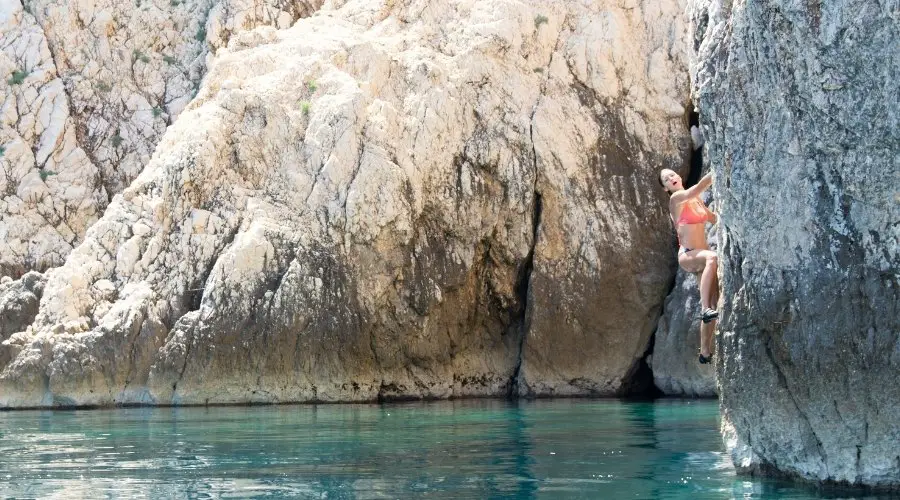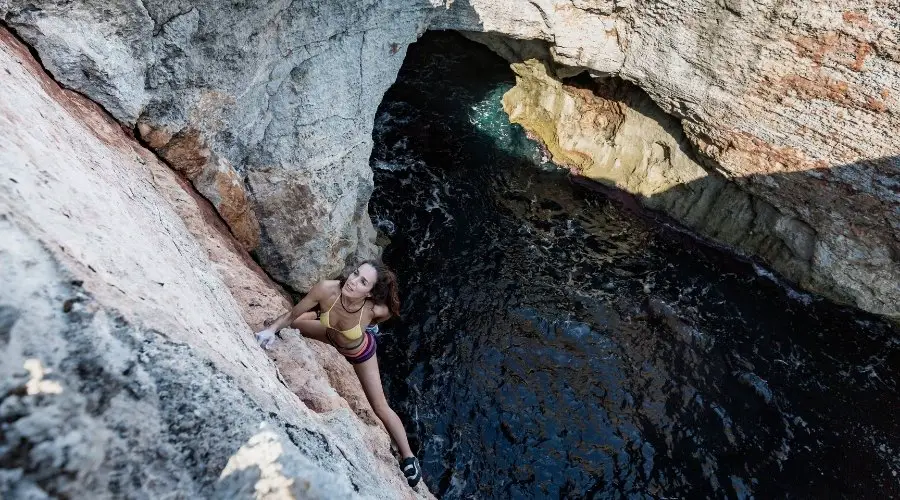Deep water soloing has been becoming more and more popular over the recent years. It has the untethered feeling of free soloing but without most of the inherent danger. Making a wrong move free soloing most likely spells serious injury or death while making a wrong move deep water soloing only means you are about to get wet. Many climbers new to deep water soloing have a lot of questions about how it logistically works. One of the most common questions being: does deep water soloing ruin your climbing shoes?
As a general rule, a session of deep water soloing (DWS) will not ruin climbing shoes. However, the salt water will slowly deteriorate the shoes over time depending on the duration and frequency of DWS sessions. Cleaning climbing shoes with fresh water and allowing them to properly dry will mitigate these effects.
There are many factors that come into play while deep water soloing that climbers need to be aware of. One of these factors is how water will affect their shoes and how to make sure their shoes stay in good condition following a deep water solo session. Some shoes will hold up and be better for deep water soloing than others. This article discusses these factors and the best shoes for deep water soloing.
What Causes Shoes To Become Damaged From Deep Water Soloing

Deep water soloing is most commonly performed over salt water or over a deep pool (i.e. the Psicobloc Wall).
Climbing shoes are designed to get wet. Whether this was to allow them to be washed or to allow them to be used in the rain, it doesn’t really matter. Getting the climbing shoes wet is not what ruins them and slowly compromises the shoes integrity from deep water soloing. It is the additives in the water that do this.
Letting salt water or chlorinated water (i.e. from a pool) sit on your climbing shoes for an extended period of time can ruin the rubber and upper materials. The salt and/or chlorine will deteriorate the rubber and cause the upper to fade and become tough.
These effects are more pronounced and take effect a lot quicker when the climbing shoes are cleaned after the deep water solo session. Rinsing them out fresh water to remove the salt/chlorine and allowing them to dry properly will help the shoes maintain their functionality for longer. If you are wondering the quickest way to properly dry out climbing shoes, check out my step by step guide.
Although washing them out will help a lot in the long run, it doesn’t completely negate the effects of having the shoes submerged in slat/chlorine for extended periods of time. Climbers who frequently deep water solo for long durations will deteriorate their shoes as the cumulative amount of exposure to the salt/chlorine water increases.
This is why many climbers choose to bring old climbing shoes with them that they do not care about to deep water solo. Why start to wear out your new good shoes when you have an old beater pair lying around?
That said, there are specific climbing shoes that perform better and will last longer for deep water soloing.
How Climbing Shoes Perform When Wet

I, along with many other climbers, have not noticed too much of any issue with friction when climbing with wet climbing shoes. In fact, a lot of climbers claim that their climbing shoes stick better when they are wet. Personally, I have not noticed this and think the shoes provide about the same amount of friction when wet vs dry.
When deep water soloing you will most likely encounter some form of moss or lichen on the rock. This is what really makes those foot holds (and hand holds) slippery. It is not the wetness of the shoes.
The climbing shoe upper material tends to stretch out a bit when it is wet. This effect is much more pronounced in shoes with leather uppers than synthetic upper shoes. The extra stretch in leather shoes causes a gap to form between the shoe and climber’s foot that normally isn’t there when dry. This can create a loose and somewhat unsure feeling in the shoe. Not to mention the weird squelching sound that happens.
Some climbers even opt to go deep water soloing barefoot so they don’t have to worry about their climbing shoes getting soaked. That isn’t the best practice however as it is usually slippery and certain shoes perform extremely well for the discipline.
Best Deep Water Soloing Shoes

While the shoe material themselves will inevitably be okay for the deep water solo session, the velcro may not. Climbers have lost many velcro strapped climbing shoes in the water while deep water soloing when the water pulls them apart. Therefore, climbing shoes with at least two velcro straps or laces are definitely the preferred type for the discipline.
The main point behind deep water soloing is to test your physical limits with a “safe” landing zone beneath you at all times. Therefore, the majority of deep water soloing routes are overhanging and are not incredibly high. This type of climbing lends itself better to aggressively downturned shoes to get a better foothold on the rock.
Combining this with the fact that leather uppers stretch out a lot more when wet creates a picture of what the ideal deep water soloing shoes are.
The best shoes for deep water soloing are aggressively downturned shoes with laces and a synthetic upper material. The Evolv Shaman are the best shoes available fitting these criteria.

Chris Sharma himself opted to wear the Evolv Shaman to send the hardest deep water solo route to date. You can check out their current price on Amazon here.
Climbers that are not quite ready for aggressive climbing shoes yet may opt for a more moderately downturned option. The Scarpa Instinct Lace are fantastic alternatives to the Evolv Shaman for these climbers. See how their price compares to the Shaman on Amazon here.
If you are unsure whether or not you are ready to transition into an aggressive climbing shoe, I recommend reading my article that details exactly when you should transition to an aggressive shoe.
